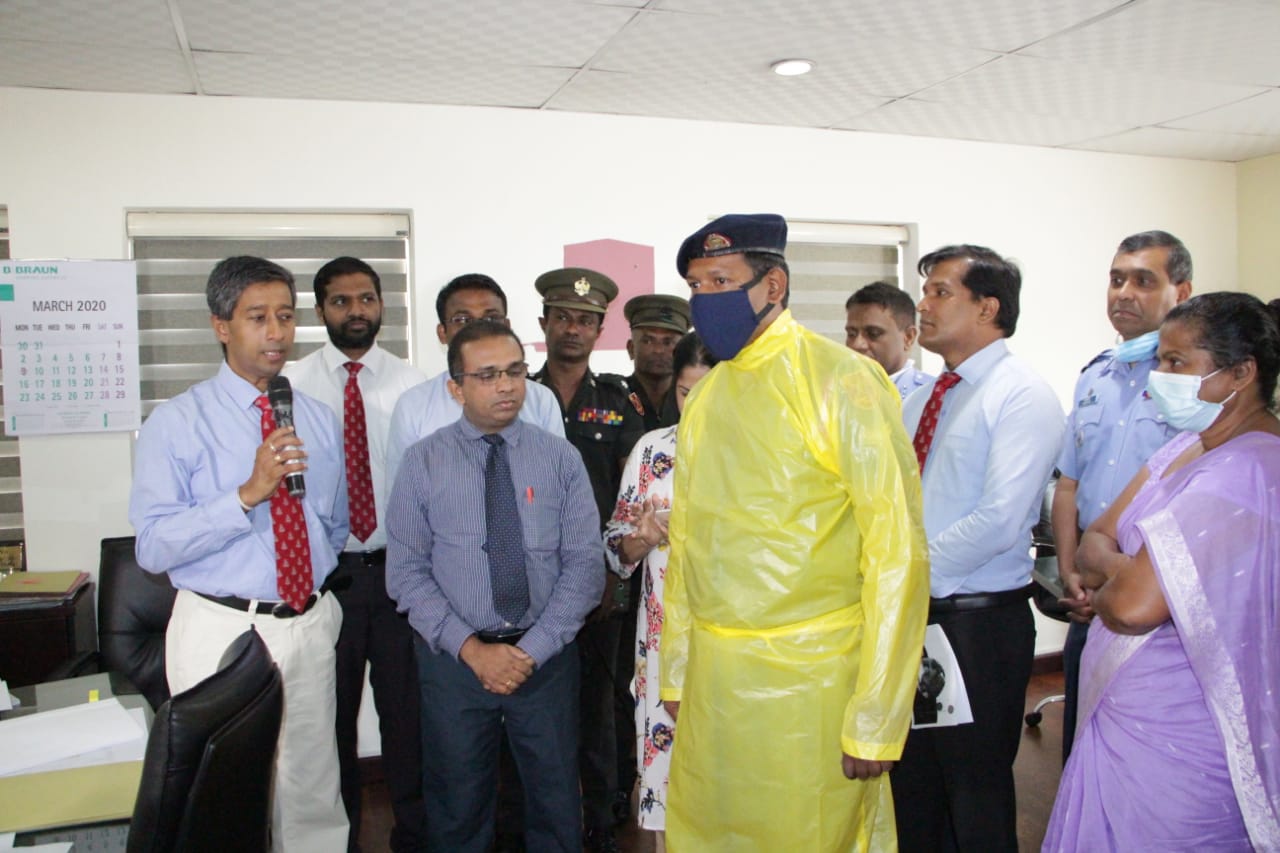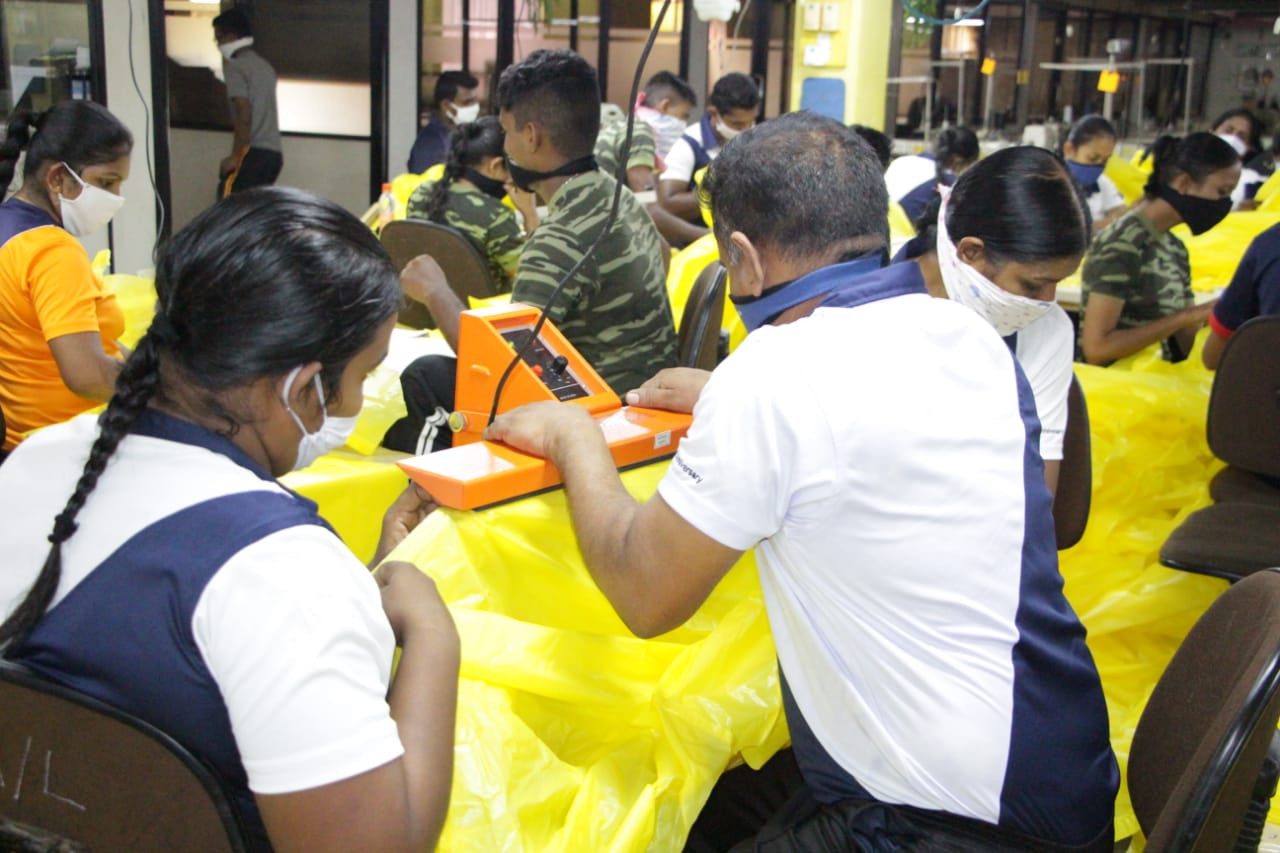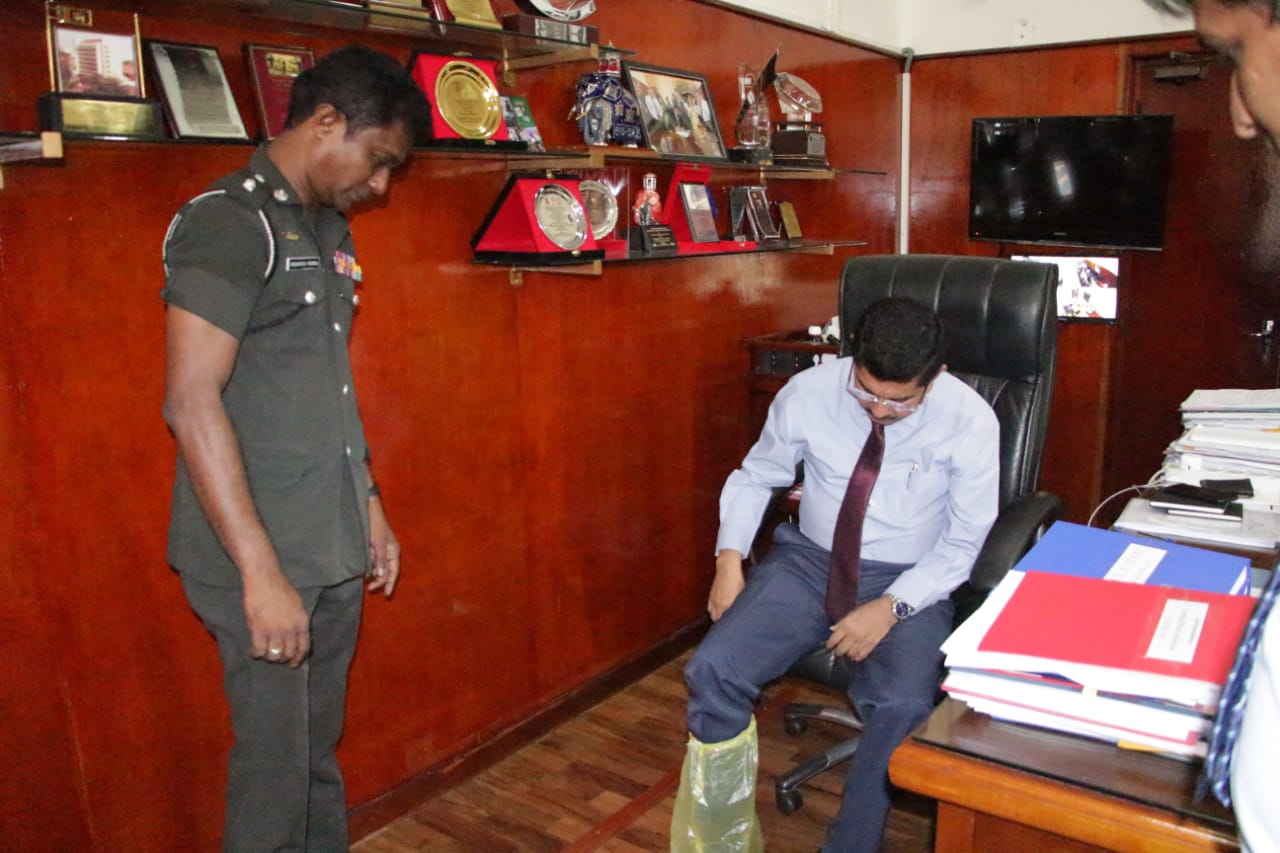Fighting against COVID-19: Soldiers and airmen stitch protective gears for health workers
April 04, 2020By Lt. Com. Dilan Jayatillake
Healthcare persons are in the frontlines of the danger zone since they act as the first respondents who are directly involved in patient’s care and keep prolonged close contacts with patients who are suspected or confirmed of COVID-19 infection.

There is more chance for coronavirus to transmit through exposure to vectors and the places where they had physical contact to which medical and healthcare personnel are routinely exposed. This has necessitated a shield for them against the hard hitting coronavirus.
Defence Secretary Maj. Gen. (Retd) Kamal Gunaratne, who is concerned on this matter, has instructed Ministry officials to seek possibility with Sri Lanka Army (SLA) and Sri Lanka Air Force (SLAF) of stitching suitable Personal Protective Equipment (PPE) for healthcare personnel to avoid them getting contact with coronavirus. He gave these instructions during a meeting held at the Ministry on March 19.
Defence Secretary also directed both Ranaviru Apparel and SLAF to coordinate with Director General of Health Services Dr. Anil Jasingha for further instructions and clarifications.
Acting upon Ministry’s directives, Commander SLAF Air Marshal Sumangala Dias had tasked their General Engineering Wing at Katunayake and Anuradhapura to undertake the job while the Commandant of Ranaviru Apparels Major General W. H. M. Manatunga got hurried to meet Dr. Anil Jasingha for further instructions.

PPE is basically a protective clothing specifically designed to protect the wearer's body from vulnerability to infections. It is merely for occupational safety and to reduce employee’s exposure to hazardous circumstances.
For so many years, the armed forces are one of the agencies that use various types of PPEs which are progressively designed to address conventional and unconventional conflicts in respective territories.
SLA’s Ranaviru Apparels garment factory has been set up to produce uniforms for troops, annually. The task of producing PPE is an unique experience to the designing unit as it is not designing an outfit to fight in an conventional warfare but a totally secured fully covered long dress against a highly contiguous virus.
Stitching of PPE was not intended to stitch similar to a regular PPE but had to satisfy special conditions. Nonetheless, this outfit is prepared for onetime use and should be disposable.
Neither sewing operators nor needle points are involved in this unique method. The output is completely a wrapped and sealed pack through the polythene sealer machines.
Not only a protective body kits but also the shoe covers which finally included in the pack are also designed. It is basically a disposable microfiber suit including shoes that can be used as a protective gear for medical authorities in treating COVID-19 hit persons.

According to the Staff Officer of Ranaviru Apparels Maj. K.S.P.N. Perera, who is also shouldering a major portion of the responsibility, said that it was a challenge for them to commence work until they acquire applicable machines and skill for producing PPEs.
“This task is an exclusive job which requires special attention and there is no room for technical flaws” he said.
“At the beginning we were looking for philanthropists to support us to this social responsibility,” Maj Perera, who was hopeful and had contacted a few of them, said.
Eventually they met the Chairperson of the Darley Company (Pvt) Ltd who is willing to support and provided two sophisticated machines to stich the protective gears.
Having equipped, Ranaviru Apparels immediately commenced work and the production team ran the process around the clock for two days.
“Determined to work in shift basis, our motive was to complete the first consignment fast to deliver the stocks to the healthcare workers, who are working closely with patients and dealing with testing” Maj Perera said.

Meanwhile, visiting the PPE production site in Katunayake, SLAF Commander Air Marshal Sumangala Dias had personally inspected their process too.
Culminating both efforts in four days, the SLA and SLAF have handed over PPE packages (500 units each) to Dr. Anil Jasingha, in conformity to the quality standards which was inspected by the Chief Technical Officer of the Health Ministry on March 23.
“I was delighted to see Dr. Anil Jasingha was wearing our PPE at the time we handed over it”, Maj Perera, who is humbly enjoying the joy of a mission accomplished, said.
Further making a leap forward, SLAF General Engineering Wing, Anuradhapura had handed over another 100 PPEs to Dr. Udaya De Silva at the Anuradhapura Government Hospital.
Dr. Udaya De Silva is the designer of the cost effective PPE Kit which is being manufactured by the SLAF.
The Commanding Officer, General Engineering Workshop in Katunayake Group Captain Indika Wickramasinghe said polythene sealer machines are being utilized for this task and over 500 are being produced conforming to the standards daily. The material is supplied by the Health Ministry, he said.
According to Major Perera, these suits are relatively inexpensive and have been produced using micron 137 (polythene) by using sealer machines gifted by the Darley Company (Pvt) Ltd.
They said that, thanks to timely decision taken by Defence Secretary Maj. Gen. Gunaratne and to give directions to commence producing PPEs, devoted differently abled veterans employed at Ranaviru Apparels and technical workforce of SLAF, were able to produce protective gears for health workers within few days.
We are running a continuous production, Maj Perera assured and also said, this would be an unceasing process until the slightly spread coronavirus in the island is controlled fully.
Similarly, SLAF technical workforce is working around the clock to manufacture as many as possible, Group Captain Wickramasinghe also assured.
“Both Ranaviru apparels factories located in Yakkala and Alawwa are working consistently and also producing uniforms for their troops amidst these type of challenges” Maj Perera explained.